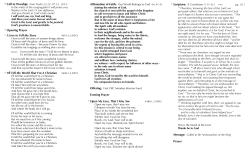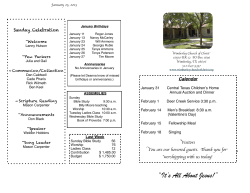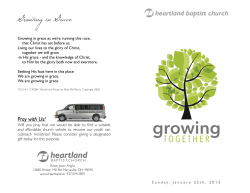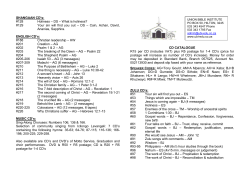
“Therefore”
LifeGroups Leader’s Guide (from the message given on Sunday, February 15) [Speaker: Pastor Albert] [Sermon Series: Book of Ephesians] “Therefore” Preparation ● Here are some questions we are asking all our leaders to constantly evaluate their group time through. Use these in your prep time to make sure your group is staying on track with the 4G movement! ○ How is the Gospel changing the lives of your group members? Have group members had any opportunities to communicate their testimony and/or share how the Gospel is currently changing them? ○ What areas are group members seeing growth or how are they being developed? How are they developing others? ○ Are you spending time getting to know group members beyond general details? Do you keep a journal of important things they mention, family members, or areas of personal struggle? ○ Do you and group members have time for people who do not know Jesus? How does your group encourage people to give their live away? ● You should also be looking at others in your group that can be identified as a cofacilitator. Who are you developing, how are you multiplying yourself? ● Announcement : Ash Wednesday Service will be held at MHS from 7:30pm 9:00pm. Encourage your LifeGroup to attend this and if you meet on Wednesdays consider going to this service as a group. Part 1 = Ice Breaker ● What was the best thing that happened to you this week? ● If you had to do this past week over again, what’s one thing you’d do differently? ● If you could change anything about yourself, what would it be? Part 2 = Discussion – This week Pastor Albert continued in chapter 2 of Ephesians and began to deal with a tension that exist in the text that Evangelical churches needs to wrestle with: Jesus Christ by the power of the cross destroyed both the dividing wall that separated God from man AND He destroyed the dividing wall of hostility that separated humankind (Jews=insider and Gentiles=outsider). In your LifeGroup this week, challenge your members to answer the question who is the “outsider” in relationship to themselves that they should be taking steps towards. Who or what type of person is different than me and how can I do life with people who live on the other side of the “wall of hostility”? Invite someone to read Ephesians 2:1118 then discuss a few of the themes that show up in this section. 1. Christ brought down the wall between man and God. a. This first idea is a recap from last week’s passage but it’s intentionally mentioned again in order to show a progression and force us to remember how we got to where we are in Christ and more importantly that we use to have “outsider” status with God. b. What are the ways in which Paul describes the “outsider” Gentiles? By what action or by whose authority can these Gentiles now claim insider status? c. Have you ever had a bad attitude towards someone who wanted “in”? Why? 2. Christ brought down the wall of hostility between Jews and Gentiles. a. Where have you seen or experienced “dividing walls of hostility” in the world and/or in your own life? b. Are there people (groups or individuals) with to whom you’ve had a difficult time relating? What do you think your greatest challenge is with doing life within a multiethnic, intergenerational, multitheological context? c. Imagine a Jewish Israeli and a Muslim ArabIsraeli both becoming followers of Christ and now sitting in a living room next to each other in your LifeGroup (replace this same scenario with the personal face of two opposing views or ways of life). What would this passage practically mean for the two of them? What lessons would they learn OR we learn from our relationships to each other? 3. Christ brought peace in order to start a new humanity ( kinous=new in kind vs time ). a. If Christ Himself is our peace, in what ways are we called to peace with one another? Do you consider yourself a peacemaker? If so, what does that look like in your life? In not, into what situations or people’s conflicts might God be calling you to be an agent of peace? b. If the church is God’s instrument in Christ for reconciliation between people of all kinds, how can it prove itself to the world when reconciliation is difficult even among its own members? c. What steps can the local church take to improve relationships among it own ranks? It has been said sarcastically the the church is the only army that shoots its own wounded. What do you say? Part 3 = Prayer ● Share prayer requests with one another. ● See the Prayer of Confession written by Moria Laidlaw based on Eph 2:1122. Use this in your prayer time this week. Prayer of Confession: Ephesians 2: 1122 Here’s a prayer of confession based on Ephesians 2:1122. It was written by Moira Laidlaw. Prayer of Confession (based on Ephesians 2: 1122) Merciful God, we celebrate the way that you chose to bring unity and peace to people—through the gift of your Son, our Lord, Jesus Christ. He broke down longstanding walls of prejudice and hostility between Jew and Gentile, male and female, slave and free. He abolished rules that restricted life and replaced them with the new commandment to love as he did. Where have we gone astray? Walls of prejudice still exist and barriers of racism still hold people back from reaching their true potential. We hear the great message of Jesus reconciling people to you, O God, and to one another, and yet we still hesitate to reach out to people when they are different in some way from us. (Recite Together) Forgive us when we create barriers rather than tear them down. Jesus has made us members of the household of God and he holds us together through the power of his Spirit. Maybe it is because we like to do things the way that we’ve always done them that creates barriers and excludes strangers, preventing them from ever having the opportunity to experience the reconciling power of Jesus in their lives. (Recite Together) Forgive us when we fail to take risks for the gospel’s sake. We remember with gratitude how people shared their faith with us so that we are no longer strangers and aliens. So we pray that the Holy Spirit will continue to bind us together in love and peace, building us up as a witnessing, welcoming and forgiving community of grace. In Jesus’ name we pray. Amen Assurance of Forgiveness (Ephesians 2:13, 10) “In Jesus you who were once far off have been brought near by the blood of Christ.” “In him we have been reconciled to God through the cross, made citizens with the saints and members of the household of God.” Hear then, the good news that in Jesus Christ we are forgiven. Thanks be to God! ~ written by Moira Laidlaw We would love to hear from you! Please send any comments or suggestions to: CommunityLife@madeforfellowship.com
© Copyright 2025











